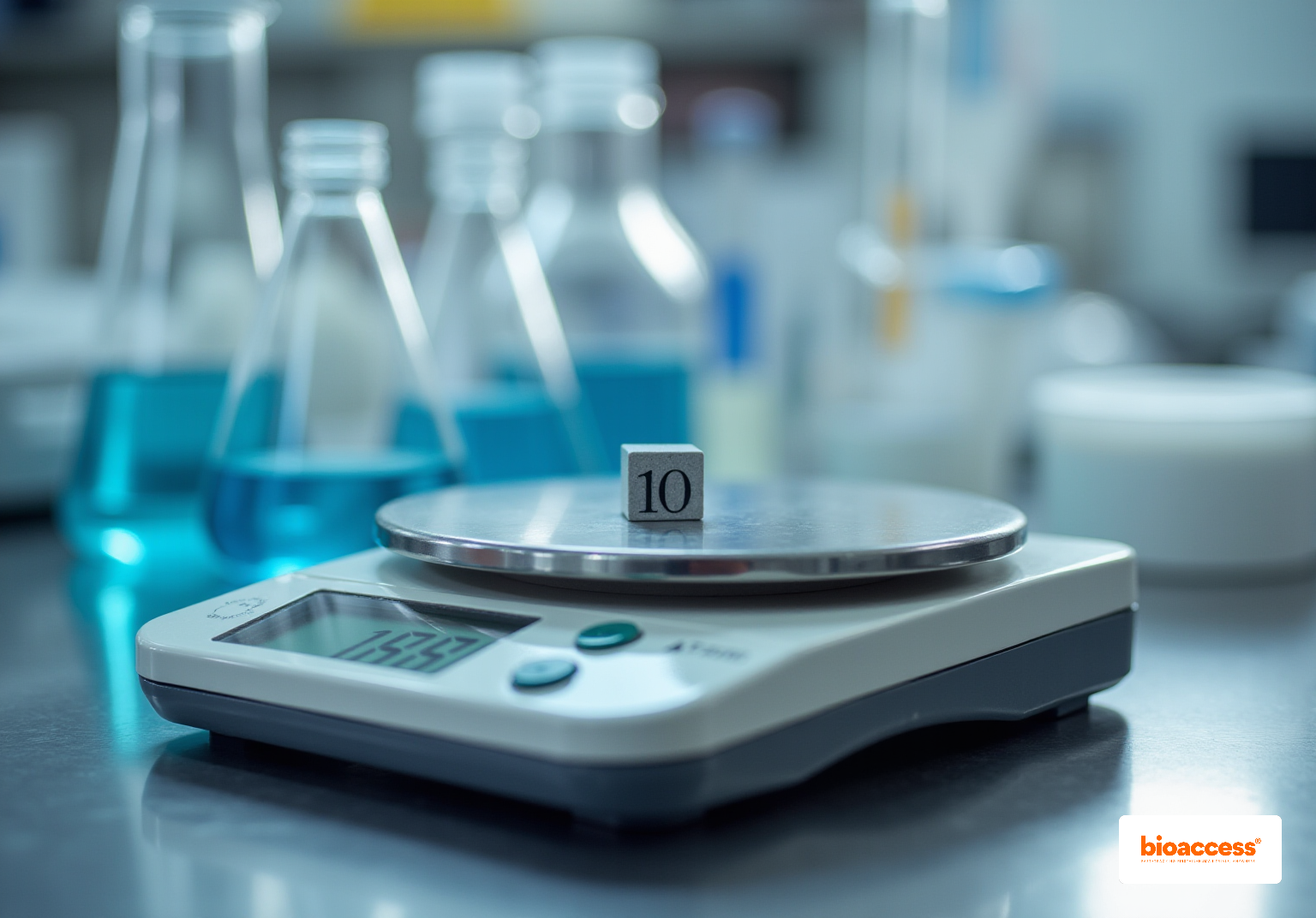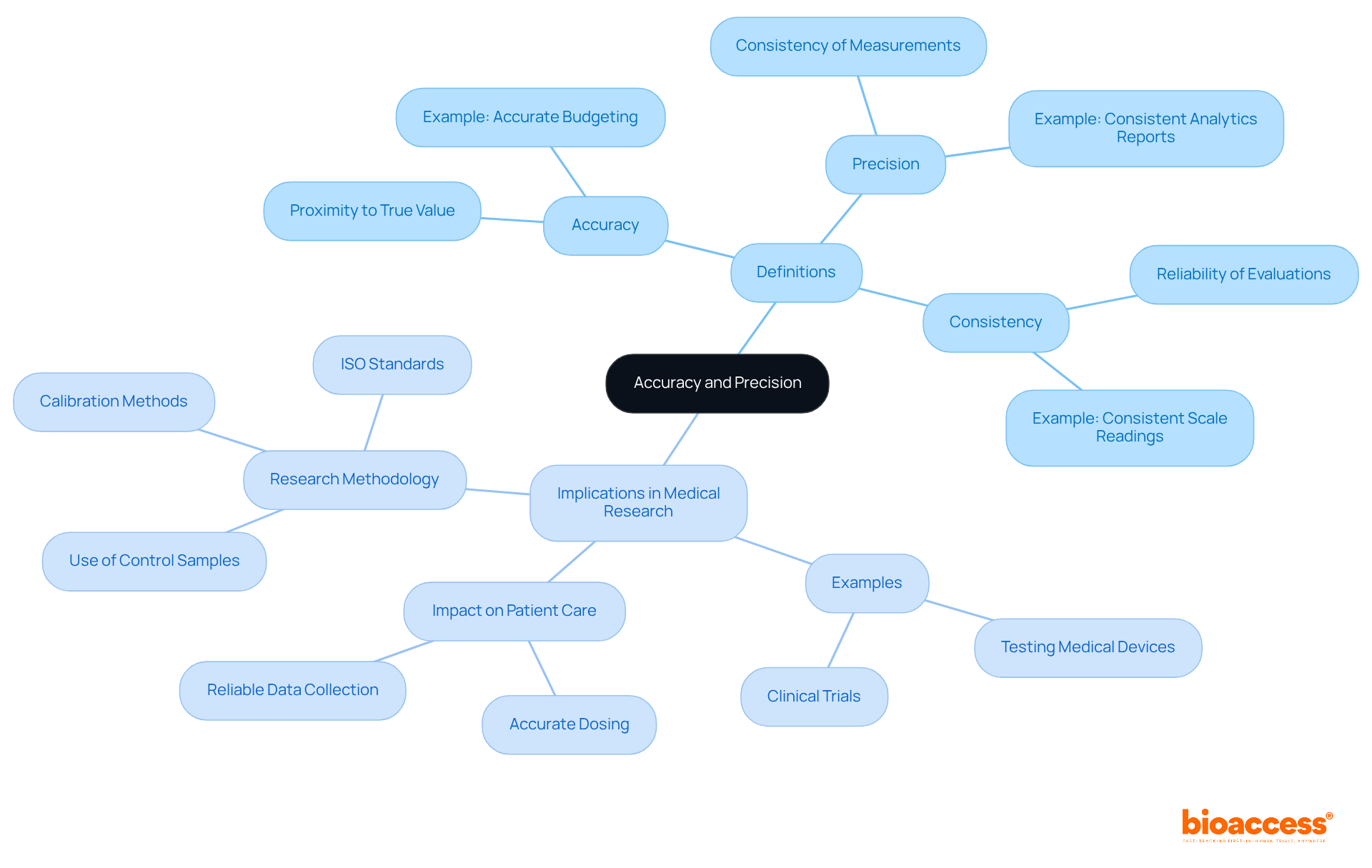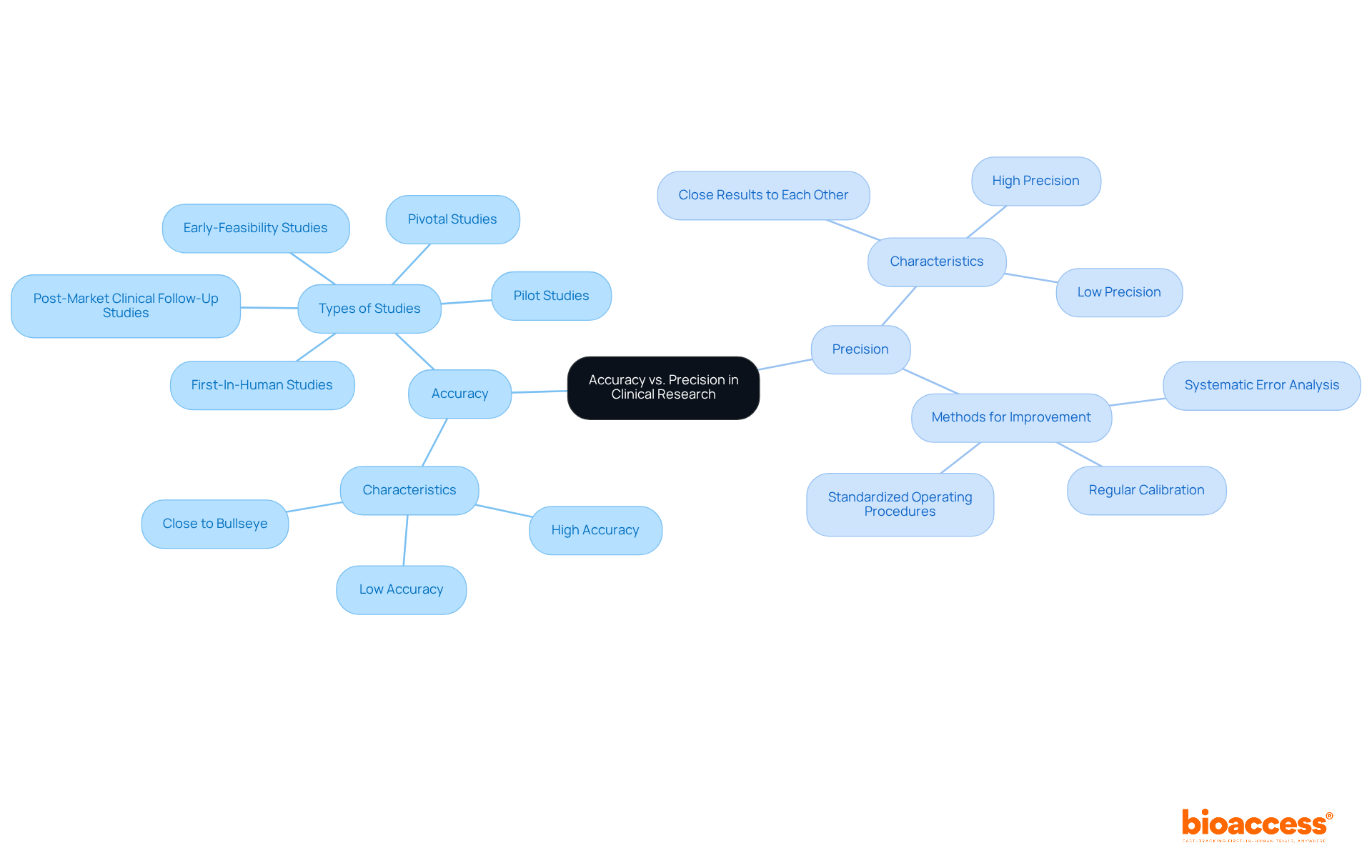


This article delves into the essential concepts of accuracy and precision in research, particularly within the realm of medical studies. Accuracy is defined as the degree to which a measurement aligns with the true value, while precision pertains to the consistency of repeated measurements. Both elements are crucial for ensuring reliable and valid research outcomes in clinical settings. Understanding these distinctions not only enhances the quality of research but also addresses significant challenges faced in the Medtech landscape. Ultimately, a firm grasp of accuracy and precision fosters collaboration among researchers, leading to more effective solutions in clinical practice.
Understanding the nuances of accuracy and precision is essential in the realm of research, particularly in medical studies where the stakes are high. These concepts dictate the reliability of findings and significantly influence patient care and treatment decisions. Yet, despite their critical importance, many researchers grapple with distinguishing between the two—leading to potential pitfalls in data interpretation.
How can researchers ensure that their studies yield both accurate and precise results, thereby enhancing the validity of their conclusions? This inquiry is not merely academic; it is a pressing concern that can impact clinical outcomes.
The meaning of accuracy and precision is defined as the extent to which a value aligns with the actual figure or recognized standard, while consistency refers to the reliability of repeated evaluations. Consider a scale that consistently indicates a 10-gram weight as 5 grams; this scenario exemplifies high consistency but low accuracy. Conversely, if the scale accurately reflects 10 grams for the same weight but shows significant variability in repeated assessments, it is accurate yet lacks consistency.
In the realm of medical research, it is crucial to grasp the meaning of accuracy and precision, as both significantly impact the validity of study findings. Exact calculations ensure that medical interventions reflect genuine effects, while precise figures guarantee reproducibility. For example, in testing medical devices, upholding high standards of accuracy and precision can profoundly influence patient care and treatment decisions.
The practical implications of these concepts are clear: in a medical study assessing a new drug, the meaning of accuracy and precision is vital, as accurate dosing prevents adverse effects, while precise evaluations of patient reactions ensure reliable data collection. As Jeff Allen, president and CEO of Friends of Cancer Research, stated, "The intent wasn’t to declare one technology better than another, but to learn if they could produce consistent and accurate results." Understanding and applying these principles in scientific evaluations and studies is essential for achieving reliable and significant research outcomes, as they are closely tied to the meaning of accuracy and precision. Furthermore, adherence to ISO standards, which clarify the meaning of accuracy and precision as a combination of trueness and exactness, underscores the importance of these concepts in research methodologies. Additionally, utilizing control samples and calibration methods can enhance the reliability of assessments, ensuring that both accuracy and exactness are preserved in research.

In medical research, understanding the meaning of accuracy and precision is paramount for preserving the integrity of study findings. Exact assessments unveil the true impacts of an intervention, while ensuring the meaning of accuracy and precision allows these evaluations to be reliably reproducible across experiments. Consider a research study evaluating a new medication—accurate dosing is vital; any errors can lead to significant discrepancies in results, potentially rendering the findings uncertain. Statistics indicate that assessment errors can severely distort outcomes, with research revealing that up to 30% of medical studies face challenges related to flawed data collection. This highlights the necessity for rigorous measurement protocols to uphold the validity of research findings.
At bioaccess, our comprehensive clinical study management services are meticulously designed to enhance the accuracy and precision of clinical assessments. Our feasibility studies and site selection processes guarantee that experiments are conducted in optimal environments, while our compliance reviews ensure adherence to country requirements, which is essential for maintaining data integrity. Additionally, our expertise in setup and project coordination mitigates risks associated with assessment inaccuracies, ensuring that protocols are consistently followed.
Case studies further underscore the significance of these principles. In a pivotal study evaluating the efficacy of a breast cancer diagnostic tool, discrepancies in measurement led to misinterpretations of the tool's effectiveness, ultimately impacting patient treatment decisions. Conversely, studies adhering to stringent accuracy and exactness standards, supported by bioaccess's services, yielded reliable data, facilitating informed decision-making and advancing medical understanding. The role of Contract Research Organizations (CROs) like bioaccess in diagnostic studies is crucial, as we enhance the efficiency and reliability of these investigations, thereby improving accuracy.
Thus, maintaining high standards is crucial because the meaning of accuracy and precision is not merely a regulatory obligation; it is a fundamental aspect of ethical medical research that directly influences patient outcomes and the advancement of healthcare. As noted by CluePoints, "Accurate data is the backbone of successful clinical trials," underscoring the critical nature of these concepts in the research process.

The dartboard analogy serves as a compelling illustration for understanding accuracy and exactness in clinical research. When darts are closely grouped yet distant from the bullseye, they exemplify high exactness but low accuracy. Conversely, if the darts are dispersed but average near the bullseye, they indicate high accuracy but low consistency.
In the realm of medical research, particularly within medical device studies overseen by bioaccess®, achieving both accuracy and precision represents the ideal scenario, though it remains a significant challenge. With over 20 years of experience in Medtech, bioaccess® prioritizes obtaining precise measurements while ensuring methodologies yield consistent outcomes across various evaluations, including:
This equilibrium is vital for drawing valid conclusions from research data. Statistics reveal that inaccuracies in medical trials can result in misdiagnoses and flawed outcomes, highlighting the urgent need for rigorous methodologies.
To improve both accuracy and precision, researchers can adopt:
By addressing these challenges, the reliability and validity of medical research can be significantly enhanced, paving the way for groundbreaking discoveries and innovative applications.

In the realm of clinical research, precise measurements are paramount. Consider a medical trial measuring blood pressure. If the sphygmomanometer consistently reads 120/80 mmHg for a patient whose true blood pressure is 130/85 mmHg, this scenario exemplifies the meaning of accuracy and precision, showing that the readings are precise but not accurate. Conversely, if the device sometimes shows 130/85 mmHg yet frequently varies between 120/80 mmHg and 140/90 mmHg, it may be correct at times but lacks consistency. Such discrepancies can lead to significant misinterpretations regarding a drug's effectiveness in lowering blood pressure.
Therefore, ensuring both the meaning of accuracy and precision in evaluations is vital for dependable health outcomes. At bioaccess®, our expertise in managing clinical trials underscores our commitment to prioritizing the meaning of accuracy and precision in all measurements. This focus is essential for the success of studies, particularly in Early-Feasibility and First-In-Human trials.

Understanding accuracy and precision is fundamental in research, particularly within the medical field, where the implications of findings can be profound. These principles are not merely theoretical; they are essential for ensuring that research outcomes are reliable, reproducible, and ultimately beneficial to patient care. By distinguishing between accuracy—relating to the closeness of measurements to a true value—and precision, which pertains to the consistency of repeated measurements, researchers can significantly enhance the integrity of their studies.
The article highlights several key points, including:
Inaccuracies can lead to substantial misinterpretations in clinical settings, underscoring the critical necessity for precise methodologies in medical research. Real-world examples illustrate how lapses in these areas can adversely affect patient outcomes and decision-making processes, reinforcing the significance of these concepts.
Ultimately, the commitment to accuracy and precision in research transcends mere compliance with standards; it embodies a dedication to ethical practices that prioritize patient safety and the advancement of healthcare. Researchers are urged to adopt best practices and methodologies that bolster these qualities in their studies. By doing so, they contribute to a body of work that not only meets scientific rigor but also drives meaningful improvements in medical treatments and patient outcomes.
What is the definition of accuracy and precision?
Accuracy refers to the extent to which a value aligns with the actual figure or recognized standard, while precision indicates the consistency or reliability of repeated evaluations.
Can you provide an example to illustrate the difference between accuracy and precision?
Yes, if a scale consistently indicates a 10-gram weight as 5 grams, it exemplifies high consistency but low accuracy. Conversely, if the scale accurately reflects 10 grams but shows significant variability in repeated assessments, it is accurate yet lacks consistency.
Why are accuracy and precision important in medical research?
In medical research, accuracy and precision are crucial because they significantly impact the validity of study findings. Accurate calculations ensure that medical interventions reflect genuine effects, while precise figures guarantee reproducibility.
How do accuracy and precision affect patient care in medical studies?
Accurate dosing prevents adverse effects, while precise evaluations of patient reactions ensure reliable data collection, both of which are essential for effective patient care and treatment decisions.
What role do ISO standards play in understanding accuracy and precision?
ISO standards clarify accuracy and precision as a combination of trueness and exactness, highlighting their importance in research methodologies.
What methods can enhance the reliability of assessments in research?
Utilizing control samples and calibration methods can enhance the reliability of assessments, ensuring that both accuracy and exactness are preserved in research.